I watched the Queen getting crowned – Britain has changed dramatically since then
How can a snapshot of the UK at the beginning of the Queen’s reign help us now? I can suggest five main lessons, writes Hamish McRae


The Jubilee may or may not be a time for celebration – that depends on your view of the world – but it should be a time for reflection. Not many heads of state have remained in post for 70 years, and the UK has changed remarkably during this period, both in social and economic terms.
It is for historians and social commentators to opine about the changes that have, for better or worse, taken place in our ideas about how societies should be ordered. From an economic perspective, however, it is worth making clear that this has been a period of massive, if uneven, progress.
I am one of the few people who remembers The Queen getting crowned, although I was in Ireland and it was barely reported. We had to watch the coronation in a private screening in the school.
Look at the pictures of a young Elizabeth and Philip, there is the sheen of glamour: the uniforms, the cars, the cut of the clothes and so on. But behind the façade was a country that was bust. Seven years after the Second World War had ended, there was still rationing of basic foods. Tea, meat, eggs, sugar and sweets were all rationed in 1952. Eggs (one per person a week) and meat were rationed until 1954. The city centres were still bombed out, for rebuilding had only just begun. We lived in Ireland and one of my childhood memories is bringing food in our suitcases when we visited my grandparents in London. Dublin was pretty scruffy then, not the glistening European capital it is now. But the cars were new, people were well fed, and there was an optimism lacking in the grime of the UK.
The historian Dominic Sandbrook, writing for the National Archives, put the point brutally: “At the beginning of the 1950s, after all, Britain had been threadbare, bombed-out, financially and morally exhausted. Its major cities were still bombsites, it was almost impossible for many families to borrow money, rationing was harsher than ever, and there was an acute shortage of decent housing.”
At a financial level, the country was still grinding away at getting the national debt under control. It was coming down but was still more than 150 per cent of GDP, whereas now, despite the surge in the past two years, it is under 100 per cent of GDP. Inflation? Well, the great surge in prices of the 1970s and 1980s was still far ahead, but the retail price index in April 1952 was up 11.8 per cent on the year, compared with 11.1 per cent in April this year.
Gradually things improved through the 1950s, so that in 1957 the prime minister, Harold Macmillan, could make his famous “never had it so good” remarks: “Indeed let us be frank about it – most of our people have never had it so good. Go around the country, go to the industrial towns, go to the farms and you will see a state of prosperity such as we have never had in my lifetime – indeed in the history of this country.”
The Swinging Sixties and the rather more troubled 1970s were of course still far ahead.
What use is this perspective? How can a snapshot of the UK at the beginning of the Queen’s reign help us now? I can suggest five main lessons, and readers will think of more.
First, and most obvious, wars are immensely destructive to wealth. The devastation of the early 1950s was the result of the effort the UK had made in the Second World War, and the debt burden hung over the country right through the 1950s and 1960s.
Second, the economic mood can flip fast. It was only three years from eggs being rationed to Macmillan being able to talk credibly of prosperity he had never seen in his lifetime.
Third, inflation was not just a scourge of the 1970s and 1980s. The inflation of the early 1950s was associated with the Korean War, which pushed up commodity prices. Once those price increases moved through the system, inflation fell back and by 1954 it dipped below 1 per cent. However, inflation over long periods does distort everything. According to the Bank of England’s nifty inflation calculator, £10 in 1952 was worth £202.30 in 2021.
Fourth, we should never be seduced by some image of a golden age of the past. The 1950s had some positive characteristics including much lower crime levels. But quite aside from the relative poverty compared with today, there were other aspects of society, including the criminalisation of homosexuality, that seem most repressive today.
Finally, ask this. What has really changed over 70 years? My answer would be technology. We are wealthier because of technical advances. We have richer lives because of the new communications technologies. We have far greater opportunities to improve our lives in ways unimaginable then. That is worth celebrating, whatever your attitude to the Jubilee itself.
Hamish McRae’s new book ‘The World in 2050 – How to Think About the Future’ has just been published by Bloomsbury.
Join our commenting forum
Join thought-provoking conversations, follow other Independent readers and see their replies
Comments
Bookmark popover
Removed from bookmarks